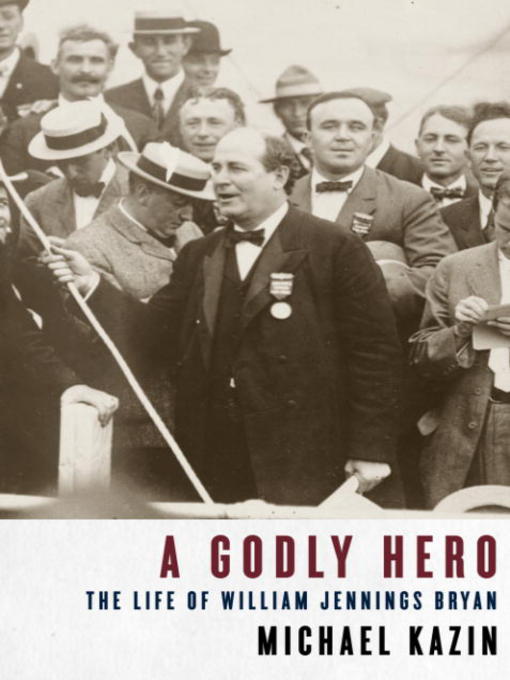
A Godly Hero
The Life of William Jennings Bryan
کتاب های مرتبط
- اطلاعات
- نقد و بررسی
- دیدگاه کاربران
نقد و بررسی

December 12, 2005
Kazin (Barons of Labor
) attempts a revisionist portrait of Bryan (1860–1925), whom scholars have long dismissed as a rabid white supremacist, bullying fundamentalist and braying pacifist/isolationist. But Kazin errs in downplaying such popular characterizations of Bryan as a closed-minded Bible-thumper and bigot. In a speech delivered, ironically, on July 4, 1906, Bryan argued that "blacks carried away into slavery have been improved by contact with the whites." Clarence Darrow referred to his Scopes trial nemesis as "the idol of all Morondom." And H.L. Mencken, after observing Bryan at the Scopes trial, wrote: "He seemed... deluded by a childish theology, full of an almost pathological hatred of all learning, all human dignity, all beauty...." In the place of these popular negative images of Bryan, Kazin argues without much success for appreciation of the attorney, orator, congressman, presidential candidate and secretary of state as 20th-century America's first great Christian liberal: an eloquent voice and leading force in the fields of anti-imperialism, consumer protection, regulation of trusts and campaign finance reform. But the fundamentalist bigot in Bryan trumps the earnest populist at every turn. In sum, Kazin's heroic Bryan is simply not to be believed.

Starred review from January 15, 2006
Kazin (history, Georgetown Univ.; The Populist Persuasion: An American History) places the -Great Commoner - squarely in the context of his times. Bryan (1860 -1925) was both a religious man and a very political man, at home teaching Bible classes or railing against tariffs. His Christianity stressed charity and social justice, and his campaigns were always more crusades than mere political contests. Bryan changed presidential politics by barnstorming in his own three presidential campaigns as well as for later Democratic nominees. His reformist ideas turned the Democrats toward progressivism and reform, which culminated in such measures as the popular election of U.S. senators and votes for women as well as many other hallmarks of the presidencies of Wilson and FDR. Kazin pulls no punches: Bryan defended Jim Crow laws passed by Democrats in the South and used gunboat diplomacy when he was secretary of state under Wilson. Though Bryan was quick to invoke religion in his causes and, as a fundamentalist, aided the prosecution in the 1925 Scopes trial, he was nothing like the champion of Babbitry that historians and Hollywood have heretofore made him out to be. Strongly recommended for public and academic libraries." -Duncan Stewart, Univ. of Iowa, Iowa City"
Copyright 2006 Library Journal, LLC Used with permission.

Starred review from February 1, 2006
Today, evangelical Christianity, particularly the fundamentalist strain, is generally aligned with political conservatism and often seems indifferent to issues, broadly defined, of "social justice." But a century ago, many Christians, inspired by the "social gospel," aligned with so-called political progressives and even radicals to form the dynamic force of populism. The personification of that force was William Jennings Bryan. History professor Kazin traces the life of this brilliant, charismatic, and flawed giant from his boyhood in Illinois to his exciting, if futile, campaigns for the presidency to his tragicomic end at the Scopes "Monkey Trial." Kazin is clearly sympathetic to both Bryan and to the goals of the populist movement. The young Bryan, as some rarely seen photographs reveal, was lean, muscular, and strikingly handsome. With his booming voice and oratorical flourishes, Bryan inspired millions, and his advocacy of causes such as direct election of senators, a graduated income tax, and federal insurance for bank deposits are now well established. But Kazin also concedes the darker side of both Bryan and populism. Bryan was often rigid, frustratingly self-righteous, and blind or indifferent to the oppression of African Americans. Populism was tinged with racism and a chronic tendency to view society from an "us versus them" perspective. This superbly written biography greatly enhances our knowledge of the man and a recurring movement in American politics.(Reprinted with permission of Booklist, copyright 2006, American Library Association.)

























دیدگاه کاربران